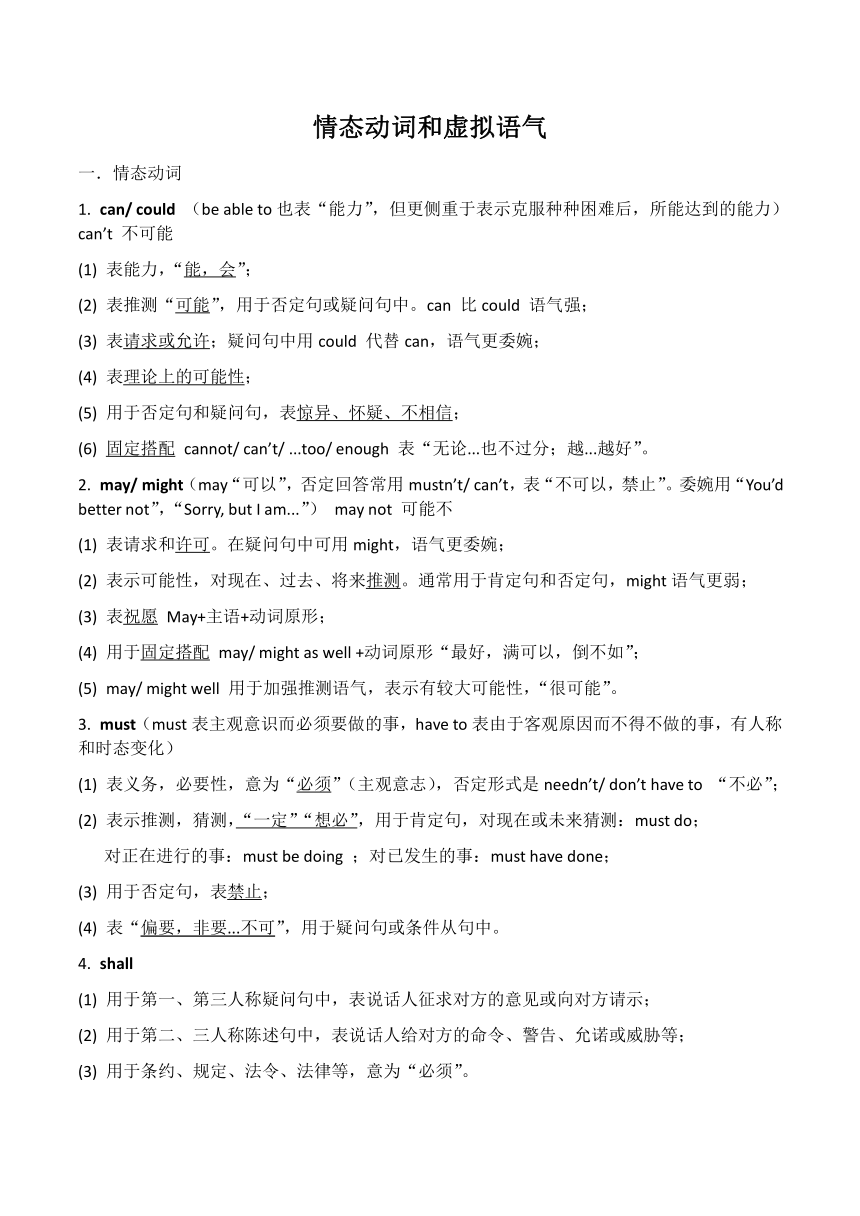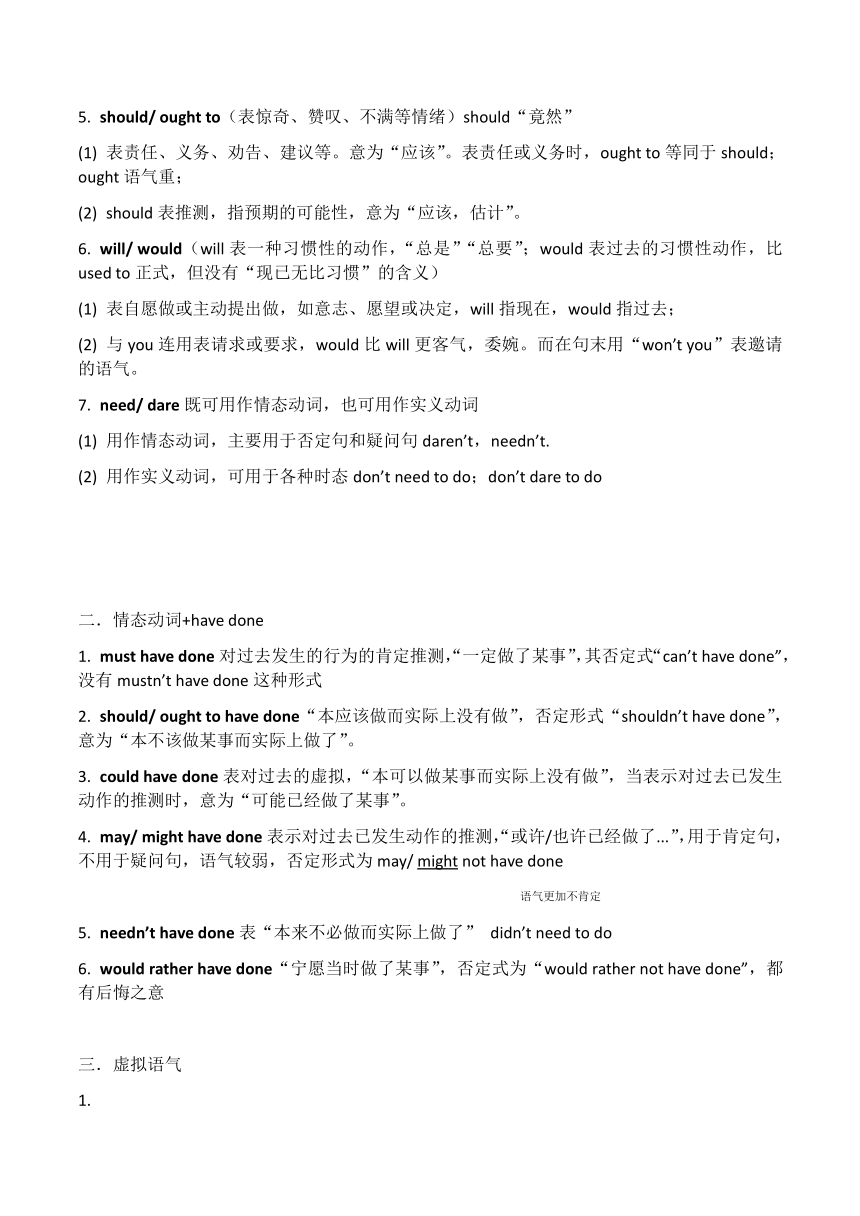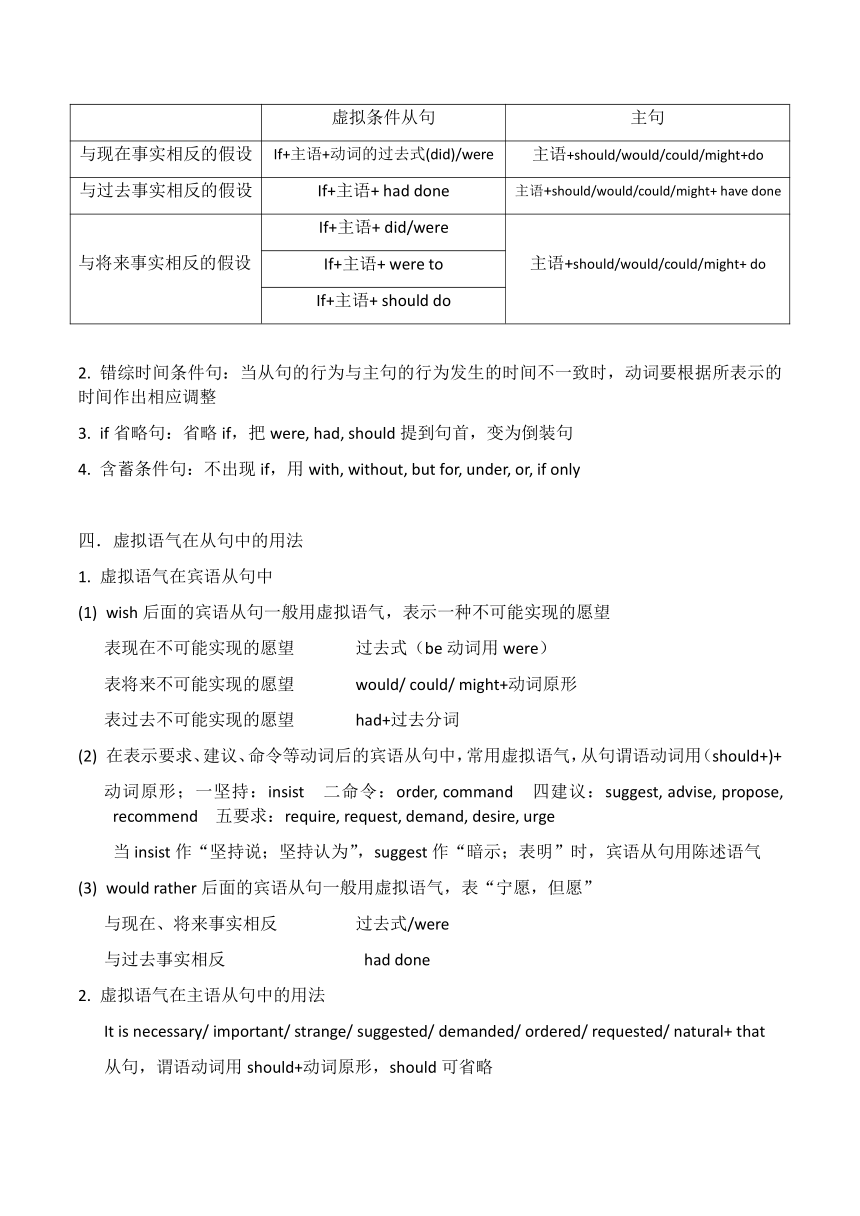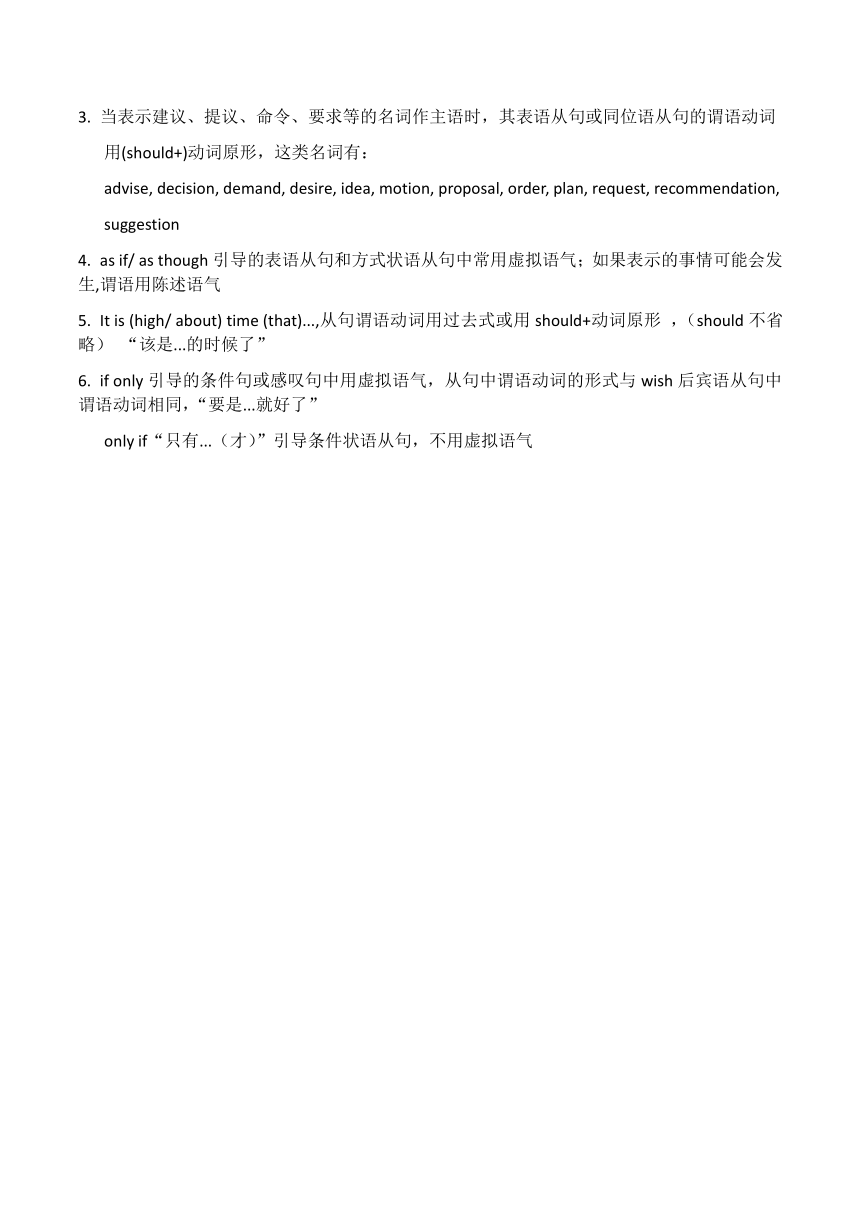高中英语情态动词和虚拟语气 导学案(含答案)-2025届高三英语复习专项
文档属性
| 名称 | 高中英语情态动词和虚拟语气 导学案(含答案)-2025届高三英语复习专项 |  | |
| 格式 | docx | ||
| 文件大小 | 26.4KB | ||
| 资源类型 | 教案 | ||
| 版本资源 | 人教版(2019) | ||
| 科目 | 英语 | ||
| 更新时间 | 2025-02-11 22:17:48 | ||
图片预览




文档简介
情态动词和虚拟语气
情态动词
can/ could (be able to也表“能力”,但更侧重于表示克服种种困难后,所能达到的能力) can’t 不可能
表能力,“能,会”;
表推测“可能”,用于否定句或疑问句中。can 比could 语气强;
表请求或允许;疑问句中用could 代替can,语气更委婉;
表理论上的可能性;
用于否定句和疑问句,表惊异、怀疑、不相信;
固定搭配 cannot/ can’t/ ...too/ enough 表“无论...也不过分;越...越好”。
may/ might(may“可以”,否定回答常用mustn’t/ can’t,表“不可以,禁止”。委婉用“You’d better not”,“Sorry, but I am...”) may not 可能不
表请求和许可。在疑问句中可用might,语气更委婉;
表示可能性,对现在、过去、将来推测。通常用于肯定句和否定句,might语气更弱;
表祝愿 May+主语+动词原形;
用于固定搭配 may/ might as well +动词原形“最好,满可以,倒不如”;
may/ might well 用于加强推测语气,表示有较大可能性,“很可能”。
must(must表主观意识而必须要做的事,have to表由于客观原因而不得不做的事,有人称和时态变化)
表义务,必要性,意为“必须”(主观意志),否定形式是needn’t/ don’t have to “不必”;
表示推测,猜测,“一定”“想必”,用于肯定句,对现在或未来猜测:must do;
对正在进行的事:must be doing ;对已发生的事:must have done;
用于否定句,表禁止;
表“偏要,非要...不可”,用于疑问句或条件从句中。
shall
用于第一、第三人称疑问句中,表说话人征求对方的意见或向对方请示;
用于第二、三人称陈述句中,表说话人给对方的命令、警告、允诺或威胁等;
用于条约、规定、法令、法律等,意为“必须”。
should/ ought to(表惊奇、赞叹、不满等情绪)should“竟然”
表责任、义务、劝告、建议等。意为“应该”。表责任或义务时,ought to等同于should;ought语气重;
should表推测,指预期的可能性,意为“应该,估计”。
will/ would(will表一种习惯性的动作,“总是”“总要”;would表过去的习惯性动作,比used to正式,但没有“现已无比习惯”的含义)
表自愿做或主动提出做,如意志、愿望或决定,will指现在,would指过去;
与you连用表请求或要求,would比will更客气,委婉。而在句末用“won’t you”表邀请的语气。
need/ dare既可用作情态动词,也可用作实义动词
用作情态动词,主要用于否定句和疑问句daren’t,needn’t.
用作实义动词,可用于各种时态don’t need to do;don’t dare to do
情态动词+have done
must have done对过去发生的行为的肯定推测,“一定做了某事”,其否定式“can’t have done”,没有mustn’t have done这种形式
should/ ought to have done“本应该做而实际上没有做”,否定形式“shouldn’t have done”,意为“本不该做某事而实际上做了”。
could have done表对过去的虚拟,“本可以做某事而实际上没有做”,当表示对过去已发生动作的推测时,意为“可能已经做了某事”。
may/ might have done表示对过去已发生动作的推测,“或许/也许已经做了...”,用于肯定句,不用于疑问句,语气较弱,否定形式为may/ might not have done
语气更加不肯定
needn’t have done表“本来不必做而实际上做了” didn’t need to do
would rather have done“宁愿当时做了某事”,否定式为“would rather not have done”,都有后悔之意
虚拟语气
虚拟条件从句 主句
与现在事实相反的假设 If+主语+动词的过去式(did)/were 主语+should/would/could/might+do
与过去事实相反的假设 If+主语+ had done 主语+should/would/could/might+ have done
与将来事实相反的假设 If+主语+ did/were 主语+should/would/could/might+ do
If+主语+ were to
If+主语+ should do
错综时间条件句:当从句的行为与主句的行为发生的时间不一致时,动词要根据所表示的时间作出相应调整
if省略句:省略if,把were, had, should提到句首,变为倒装句
含蓄条件句:不出现if,用with, without, but for, under, or, if only
虚拟语气在从句中的用法
虚拟语气在宾语从句中
wish后面的宾语从句一般用虚拟语气,表示一种不可能实现的愿望
表现在不可能实现的愿望 过去式(be动词用were)
表将来不可能实现的愿望 would/ could/ might+动词原形
表过去不可能实现的愿望 had+过去分词
在表示要求、建议、命令等动词后的宾语从句中,常用虚拟语气,从句谓语动词用(should+)+
动词原形;一坚持:insist 二命令:order, command 四建议:suggest, advise, propose, recommend 五要求:require, request, demand, desire, urge
当insist作“坚持说;坚持认为”,suggest作“暗示;表明”时,宾语从句用陈述语气
would rather后面的宾语从句一般用虚拟语气,表“宁愿,但愿”
与现在、将来事实相反 过去式/were
与过去事实相反 had done
虚拟语气在主语从句中的用法
It is necessary/ important/ strange/ suggested/ demanded/ ordered/ requested/ natural+ that
从句,谓语动词用should+动词原形,should可省略
当表示建议、提议、命令、要求等的名词作主语时,其表语从句或同位语从句的谓语动词
用(should+)动词原形,这类名词有:
advise, decision, demand, desire, idea, motion, proposal, order, plan, request, recommendation,
suggestion
as if/ as though引导的表语从句和方式状语从句中常用虚拟语气;如果表示的事情可能会发生,谓语用陈述语气
It is (high/ about) time (that)...,从句谓语动词用过去式或用should+动词原形 ,(should不省略) “该是...的时候了”
if only引导的条件句或感叹句中用虚拟语气,从句中谓语动词的形式与wish后宾语从句中谓语动词相同,“要是...就好了”
only if“只有...(才)”引导条件状语从句,不用虚拟语气
情态动词和虚拟语气练习题
How ________ you do such a silly thing
We ______ ______ ______ finish it ahead of time, though it was such a tough task.
You ________ be too careful while driving.
Always believe that good things are possible, and remember that mistakes ______ be lessons that lead to discoveries.
- May I take this book out of the reading room - No, you ______. You read it in here.
______ you succeed!
If you think the price of beef is too high, you _____ _____ _____ buy some pork.
It depends on you.
What you say ______ ______ be true.
You _______ park here! It’s an emergency exit.
________ you make so much noise
- Where did you get this book
- I pick it up from a second-hand bookshop if you _______ know.
Shall I go out for a walk after supper
Shall the driver wait outside
I promised he ______ get a present for his birthday.
It has been announced that candidates _______ remain in their seats until all the papers have been collected.
You ______ not to be so selfish.
That he _______ speak to you like that is quite astonishing.
___________ you mind opening the window for me
Wearing proper clothes is important too, for locals ______ judge you by what you wear.(表规律性的“注定会”)
- Are you coming with me - I can’t, Alice. I ________.(不敢)
It’s quite warm here; we ______ (不必)turn the heating on yet.
You don’t _____ _____ do it yourself.(必要)
Most people hate Harry but they don’t ________ ______ say so.
He _____ ______ _____ on regretting it, as too many of us do.(本可以)(go)
The boy _____ ______ ______ the truth, but I am not quite sure.(也许)(know)
He is sweating heavily.He _____ _____ ______ (practice) weight-lifting for a long time.
You ______ ______ ______ (tell) her the truth.(本不该)
You ______ ______ ______ ______ (do) this exercise more carefully.(本该)
I raised objectives at the meeting, but now I _____ _____ _____ _____ _____ that.(宁愿没做)
Maybe if I _____ _____ (study) science, and not literature then, I _____ _____ able to give you more help.
______ I known about this computer program, a huge amount of time and energy would have been saved.
______ your help, we couldn’t have finished this work ahead of time.
= ______ _____ your help, ... = If it had not been for your help, ...
= ______ it not _____ for your help, ....
I wish (that) I ______ a bird and ______ fly freely in the sky.
The suggestion is that our school _____ _______ (provide) more books about popular science.
Teacher recommend parents ______ ______ (allow) their children under 12 to ride bicycles to school for safety.
It is strange that he (_____) ______ (react) in this way.
It is (high) time that you _____ / _____ _____ (go) to school.
He stood up and offered her his seat, as if he ______ ______ her mind.(read)
It looks as if it _____ _____ _____ rain.
Look at the trouble we’re in. If only we _______ _______ (take) our teacher’s advice.
- Our company will organize a trip to Hong Kong next month. I’m taking my mother there.
- I’d rather you _______ (do). After all, she has just recovered from her illness and she still feels weak.
情态动词和虚拟语气
1.Could 2.were able to. 3.can’t 4.can 5.mustn’t 6.May 7.may as well
8.may well 9.mustn’t 10.Must 11.must 14.shall 15.shall 16.ought 17.should(竟然) 18.Would 19. will 20. daren’t 21.needn’t 22.need to 23.dare to 24.could have gone 25.might have known 26.must have practiced 27.shouldn’t have told 28.ought to have done 29.would rather not have done 30.had studied, would be 31.Had 32.Without, But for, Had been 33.were, could 34.should provide 35.not allow 36.(should) react 37.went/ should go 38.had read 39.is going to 40.had taken 41.didn’t
情态动词
can/ could (be able to也表“能力”,但更侧重于表示克服种种困难后,所能达到的能力) can’t 不可能
表能力,“能,会”;
表推测“可能”,用于否定句或疑问句中。can 比could 语气强;
表请求或允许;疑问句中用could 代替can,语气更委婉;
表理论上的可能性;
用于否定句和疑问句,表惊异、怀疑、不相信;
固定搭配 cannot/ can’t/ ...too/ enough 表“无论...也不过分;越...越好”。
may/ might(may“可以”,否定回答常用mustn’t/ can’t,表“不可以,禁止”。委婉用“You’d better not”,“Sorry, but I am...”) may not 可能不
表请求和许可。在疑问句中可用might,语气更委婉;
表示可能性,对现在、过去、将来推测。通常用于肯定句和否定句,might语气更弱;
表祝愿 May+主语+动词原形;
用于固定搭配 may/ might as well +动词原形“最好,满可以,倒不如”;
may/ might well 用于加强推测语气,表示有较大可能性,“很可能”。
must(must表主观意识而必须要做的事,have to表由于客观原因而不得不做的事,有人称和时态变化)
表义务,必要性,意为“必须”(主观意志),否定形式是needn’t/ don’t have to “不必”;
表示推测,猜测,“一定”“想必”,用于肯定句,对现在或未来猜测:must do;
对正在进行的事:must be doing ;对已发生的事:must have done;
用于否定句,表禁止;
表“偏要,非要...不可”,用于疑问句或条件从句中。
shall
用于第一、第三人称疑问句中,表说话人征求对方的意见或向对方请示;
用于第二、三人称陈述句中,表说话人给对方的命令、警告、允诺或威胁等;
用于条约、规定、法令、法律等,意为“必须”。
should/ ought to(表惊奇、赞叹、不满等情绪)should“竟然”
表责任、义务、劝告、建议等。意为“应该”。表责任或义务时,ought to等同于should;ought语气重;
should表推测,指预期的可能性,意为“应该,估计”。
will/ would(will表一种习惯性的动作,“总是”“总要”;would表过去的习惯性动作,比used to正式,但没有“现已无比习惯”的含义)
表自愿做或主动提出做,如意志、愿望或决定,will指现在,would指过去;
与you连用表请求或要求,would比will更客气,委婉。而在句末用“won’t you”表邀请的语气。
need/ dare既可用作情态动词,也可用作实义动词
用作情态动词,主要用于否定句和疑问句daren’t,needn’t.
用作实义动词,可用于各种时态don’t need to do;don’t dare to do
情态动词+have done
must have done对过去发生的行为的肯定推测,“一定做了某事”,其否定式“can’t have done”,没有mustn’t have done这种形式
should/ ought to have done“本应该做而实际上没有做”,否定形式“shouldn’t have done”,意为“本不该做某事而实际上做了”。
could have done表对过去的虚拟,“本可以做某事而实际上没有做”,当表示对过去已发生动作的推测时,意为“可能已经做了某事”。
may/ might have done表示对过去已发生动作的推测,“或许/也许已经做了...”,用于肯定句,不用于疑问句,语气较弱,否定形式为may/ might not have done
语气更加不肯定
needn’t have done表“本来不必做而实际上做了” didn’t need to do
would rather have done“宁愿当时做了某事”,否定式为“would rather not have done”,都有后悔之意
虚拟语气
虚拟条件从句 主句
与现在事实相反的假设 If+主语+动词的过去式(did)/were 主语+should/would/could/might+do
与过去事实相反的假设 If+主语+ had done 主语+should/would/could/might+ have done
与将来事实相反的假设 If+主语+ did/were 主语+should/would/could/might+ do
If+主语+ were to
If+主语+ should do
错综时间条件句:当从句的行为与主句的行为发生的时间不一致时,动词要根据所表示的时间作出相应调整
if省略句:省略if,把were, had, should提到句首,变为倒装句
含蓄条件句:不出现if,用with, without, but for, under, or, if only
虚拟语气在从句中的用法
虚拟语气在宾语从句中
wish后面的宾语从句一般用虚拟语气,表示一种不可能实现的愿望
表现在不可能实现的愿望 过去式(be动词用were)
表将来不可能实现的愿望 would/ could/ might+动词原形
表过去不可能实现的愿望 had+过去分词
在表示要求、建议、命令等动词后的宾语从句中,常用虚拟语气,从句谓语动词用(should+)+
动词原形;一坚持:insist 二命令:order, command 四建议:suggest, advise, propose, recommend 五要求:require, request, demand, desire, urge
当insist作“坚持说;坚持认为”,suggest作“暗示;表明”时,宾语从句用陈述语气
would rather后面的宾语从句一般用虚拟语气,表“宁愿,但愿”
与现在、将来事实相反 过去式/were
与过去事实相反 had done
虚拟语气在主语从句中的用法
It is necessary/ important/ strange/ suggested/ demanded/ ordered/ requested/ natural+ that
从句,谓语动词用should+动词原形,should可省略
当表示建议、提议、命令、要求等的名词作主语时,其表语从句或同位语从句的谓语动词
用(should+)动词原形,这类名词有:
advise, decision, demand, desire, idea, motion, proposal, order, plan, request, recommendation,
suggestion
as if/ as though引导的表语从句和方式状语从句中常用虚拟语气;如果表示的事情可能会发生,谓语用陈述语气
It is (high/ about) time (that)...,从句谓语动词用过去式或用should+动词原形 ,(should不省略) “该是...的时候了”
if only引导的条件句或感叹句中用虚拟语气,从句中谓语动词的形式与wish后宾语从句中谓语动词相同,“要是...就好了”
only if“只有...(才)”引导条件状语从句,不用虚拟语气
情态动词和虚拟语气练习题
How ________ you do such a silly thing
We ______ ______ ______ finish it ahead of time, though it was such a tough task.
You ________ be too careful while driving.
Always believe that good things are possible, and remember that mistakes ______ be lessons that lead to discoveries.
- May I take this book out of the reading room - No, you ______. You read it in here.
______ you succeed!
If you think the price of beef is too high, you _____ _____ _____ buy some pork.
It depends on you.
What you say ______ ______ be true.
You _______ park here! It’s an emergency exit.
________ you make so much noise
- Where did you get this book
- I pick it up from a second-hand bookshop if you _______ know.
Shall I go out for a walk after supper
Shall the driver wait outside
I promised he ______ get a present for his birthday.
It has been announced that candidates _______ remain in their seats until all the papers have been collected.
You ______ not to be so selfish.
That he _______ speak to you like that is quite astonishing.
___________ you mind opening the window for me
Wearing proper clothes is important too, for locals ______ judge you by what you wear.(表规律性的“注定会”)
- Are you coming with me - I can’t, Alice. I ________.(不敢)
It’s quite warm here; we ______ (不必)turn the heating on yet.
You don’t _____ _____ do it yourself.(必要)
Most people hate Harry but they don’t ________ ______ say so.
He _____ ______ _____ on regretting it, as too many of us do.(本可以)(go)
The boy _____ ______ ______ the truth, but I am not quite sure.(也许)(know)
He is sweating heavily.He _____ _____ ______ (practice) weight-lifting for a long time.
You ______ ______ ______ (tell) her the truth.(本不该)
You ______ ______ ______ ______ (do) this exercise more carefully.(本该)
I raised objectives at the meeting, but now I _____ _____ _____ _____ _____ that.(宁愿没做)
Maybe if I _____ _____ (study) science, and not literature then, I _____ _____ able to give you more help.
______ I known about this computer program, a huge amount of time and energy would have been saved.
______ your help, we couldn’t have finished this work ahead of time.
= ______ _____ your help, ... = If it had not been for your help, ...
= ______ it not _____ for your help, ....
I wish (that) I ______ a bird and ______ fly freely in the sky.
The suggestion is that our school _____ _______ (provide) more books about popular science.
Teacher recommend parents ______ ______ (allow) their children under 12 to ride bicycles to school for safety.
It is strange that he (_____) ______ (react) in this way.
It is (high) time that you _____ / _____ _____ (go) to school.
He stood up and offered her his seat, as if he ______ ______ her mind.(read)
It looks as if it _____ _____ _____ rain.
Look at the trouble we’re in. If only we _______ _______ (take) our teacher’s advice.
- Our company will organize a trip to Hong Kong next month. I’m taking my mother there.
- I’d rather you _______ (do). After all, she has just recovered from her illness and she still feels weak.
情态动词和虚拟语气
1.Could 2.were able to. 3.can’t 4.can 5.mustn’t 6.May 7.may as well
8.may well 9.mustn’t 10.Must 11.must 14.shall 15.shall 16.ought 17.should(竟然) 18.Would 19. will 20. daren’t 21.needn’t 22.need to 23.dare to 24.could have gone 25.might have known 26.must have practiced 27.shouldn’t have told 28.ought to have done 29.would rather not have done 30.had studied, would be 31.Had 32.Without, But for, Had been 33.were, could 34.should provide 35.not allow 36.(should) react 37.went/ should go 38.had read 39.is going to 40.had taken 41.didn’t
